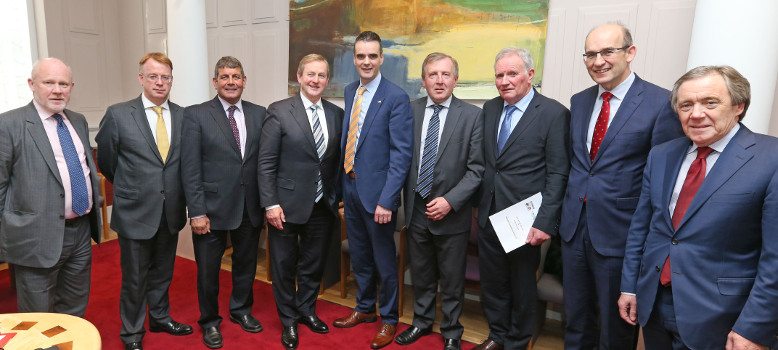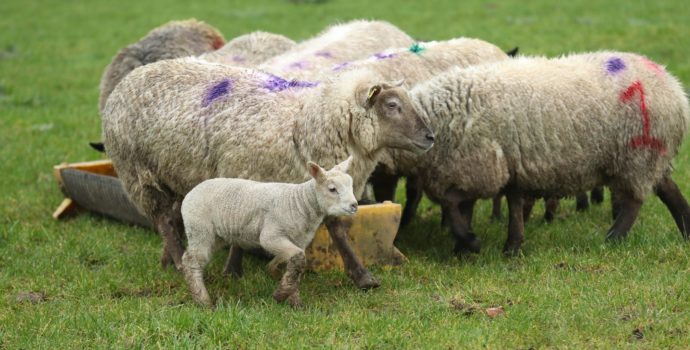Agri-food Leaders Meet Taoiseach Enda Kenny on Brexit Issues

IFA and representatives from the agri-food industry have met with the Taoiseach Enda Kenny to put forward the key issues for the sector arising from Brexit ahead of the crucial EU Summit on Saturday.
Representatives from Food Drink Ireland, Meat Industry Ireland and the Irish Dairy Industry Association joined IFA President Joe Healy in making a strong case for the measures needed by the sector.
IFA President Joe Healy said, “Brexit has the potential to have a devastating impact on farming and food. It’s our largest indigenous sector and the UK is our most important market. Our message to the Taoiseach was clear: the sector’s issues have to be at the forefront of what is agreed by the EU leaders next weekend”.
Mr Philip Carroll, Chairman of MII said that “the food industry delegation highlighted the critical importance of business certainty through the negotiation process to a new trading relationship with the UK and therefore the absolute need for a transition period. He also outlined the need for the Government to act immediately on a series of short term measures to ensure that Irish food exports maintain their market share in the UK while negotiations are ongoing.”
The delegation identified the key priorities for the sector in relation to the EU negotiating mandate for the Brexit negotiations. These were:
Discussions on the future EU-UK trading relationship
In order to minimise economic uncertainty and the potential for major economic damage for exposed sectors, discussions on the future EU-UK relationship must be commenced early in the negotiating process.
Maintaining access to and the value of the UK Market
The retention of free access to and maintenance of the value of the UK market is of critical importance. In addition, disruption to the highly integrated trade flows between Ireland and Northern Ireland must be minimised. To achieve this, a Comprehensive Free Trade Agreement (FTA) between the EU and UK is required, with the optimum outcome that the UK remains within the EU Customs Union. The FTA must include the following elements:
- Both sides must commit to negotiate an ambitious and balanced agreement that prioritises continued tariff and barrier free trade, long-term growth, investment and stability.
- The agreement should take account of the special case of the island of Ireland, ensuring that the highly integrated supply chains can continue to operate with free movement of goods and services.
- In acceding to a FTA with the UK, the EU must ensure that the value of the UK market is not undermined through lower cost imports, which do not meet the standards required of the EU agri-food sector.
Short & medium term measures
The delegation put forward a number of short and medium term measures to support the agri-food sector:
- The relaxation of state aids restrictions at both farming and industry level that impact on the ability of Ireland to address critical stabilisation support measures and strategic transformative initiatives. “Brexit – the exceptional case for state aid supports for the food and drink sector sets out a comprehensive case justifying the necessary relaxation in EU state aid restrictions for Ireland in the light of the fracture and serious disturbance caused to the Irish economy resulting from Brexit;
- Direct support for farmers through CAP Market Support or other measures to be made available in the event of further Sterling depreciation during exit negotiations.
- An intense and ongoing focus on cost competitiveness led by the Department of Jobs, Enterprise and Innovation in areas such as labour, energy and insurance.
- The re-introduction of the Employment Subsidy Scheme and the Enterprise Stabilisation measures which were last applied during the financial crisis in 2009-2011;
- €25 million in funding for market diversification and product innovation measures, administered by Bord Bia and Enterprise Ireland; In addition, trade support measures including export trade financing and export credit guarantees to support the continued development of international export markets;
- A substantial increase in resourcing of the international market access unit of the Department of Agriculture, Food and the Marine;
- An access to finance package that includes sustainable financing via funding from the Irish Strategic Investment Fund and the SBCI;
CAP Budget Post 2020
EU solidarity with farmers requires that there must be no reduction in the CAP budget arising from the UK exit.
Transitional arrangements
Transitional arrangements for businesses to plan and prepare for any new FTA arrangements must be put in place, as required. It is critical that companies retain as full access to each other’s markets as possible. The transitional arrangements must prioritise:
- Avoiding tariffs and import quota regimes
- Avoiding requirements for new customs procedures (e.g. documentation and certification) which would create barriers to trade, delays, and increase administrative costs.
Overall, customs procedures must be dealt with as part of the first phase of Article 50 negotiations.
Structural and Adjustment Funding
Structural and adjustment funding must be provided by the EU, if required, to the farming and food sectors that are disadvantaged due to changes in the relationship post Brexit between the EU and UK.




